
Agent Orange is a chemical herbicide and defoliant, one of the "tactical use" Rainbow Herbicides. It was used by the U.S. military as part of its herbicidal warfare program, Operation Ranch Hand, during the Vietnam War from 1961 to 1971. It is a mixture of equal parts of two herbicides, 2,4,5-T and 2,4-D. In addition to its damaging environmental effects, traces of dioxin found in the mixture have caused major health problems for many individuals who were exposed, and their offspring.
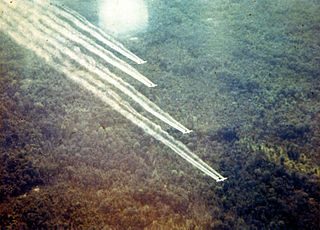
Operation Ranch Hand was a U.S. military operation during the Vietnam War, lasting from 1962 until 1971. Largely inspired by the British use of 2,4,5-T and 2,4-D during the Malayan Emergency in the 1950s, it was part of the overall herbicidal warfare program during the war called "Operation Trail Dust". Ranch Hand involved spraying an estimated 19 million U.S. gallons (72,000 m3) of defoliants and herbicides over rural areas of South Vietnam in an attempt to deprive the Viet Cong of food and vegetation cover. Areas of Laos and Cambodia were also sprayed to a lesser extent. Nearly 20,000 sorties were flown between 1961 and 1971.

Veterans for Peace is an organization founded in 1985. Initially made up of US military veterans of World War II, the Korean War, the Vietnam War, the Gulf War, the War in Afghanistan and the Iraq War, and as well as peacetime veterans and non-veterans, it has since spread overseas and has an active offshoot in the United Kingdom. The group works to promote alternatives to war.

Vietnam Veterans Against the War (VVAW) is an American tax-exempt non-profit organization and corporation founded in 1967 to oppose the United States policy and participation in the Vietnam War. VVAW says it is a national veterans' organization that campaigns for peace, justice, and the rights of all United States military veterans. It publishes a twice-yearly newsletter, The Veteran; this was earlier published more frequently as 1st Casualty (1971–1972) and then as Winter Soldier (1973–1975).
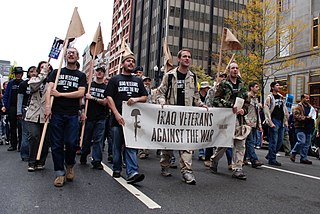
Iraq Veterans Against the War (IVAW) is an advocacy group of formerly active-duty United States military personnel, Iraq War veterans, Afghanistan War veterans, and other veterans who have served since the September 11, 2001 attacks; who were opposed to the U.S. military invasion and occupation in Iraq from 2003 to 2011. The organization advocated the immediate withdrawal of all coalition forces in Iraq, and reparations paid to the Iraqi people. It also provides support services for returning veterans to include health care and mental health.

Sir! No Sir! is a 2005 documentary by Displaced Films about the anti-war movement within the ranks of the United States Armed Forces during the Vietnam War. The film was produced, directed, and written by David Zeiger. The film had a theatrical run in 80 cities throughout the U.S. and Canada in 2006, and was broadcast worldwide on: Sundance Channel, Discovery Channel, BBC, ARTE France, ABC Australia, SBC Spain, ZDF Germany, YLE Finland, RT, and several others.

The Rainbow Herbicides are a group of tactical-use chemicals used by the United States military in Southeast Asia during the Vietnam War. Success with Project AGILE field tests with herbicides in South Vietnam in 1961 and inspiration from the British use of herbicides and defoliants during the Malayan Emergency in the 1950s led to the formal herbicidal program Trail Dust. Herbicidal warfare is the use of substances primarily designed to destroy the plant-based ecosystem of an agricultural food production and/or to destroy foliage which provides the enemy cover.

R&R, military slang for rest and recuperation, is an abbreviation used for the free time of a soldier or international UN staff serving in unaccompanied duty stations. The term is used by a number of militaries such as the United States Armed Forces and British Armed Forces. In the UK, the term applies to a type of leave granted to personnel during an overseas deployment which allows them to return home to the UK to visit their family.
Michael Uhl (1944-) is a Vietnam veteran, antiwar activist, critic and academic.
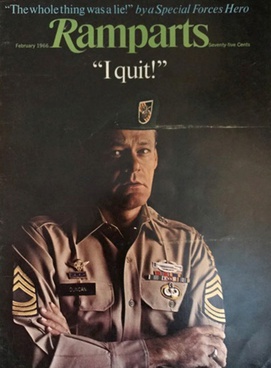
Master Sergeant Donald Walter Duncan was a U.S. Army Special Forces soldier who served during the Vietnam War, helping to establish the guerrilla infiltration force Project DELTA there. Following his return to the United States, Duncan became one of the earliest military opponents of the war and one of the antiwar movement leading public figures. Duncan is best remembered as the cover image on the February 1966 issue of Ramparts where he announced "I quit", as well as for his testimony to the 1967 Russell Tribunal detailing American war crimes in Vietnam.

The Fort Hood Three were three United States Army soldiers – Private First Class James Johnson, Private David A. Samas, and Private Dennis Mora – who refused to be deployed to fight in the Vietnam War on June 30, 1966. This was the first public refusal of orders to Vietnam, and one of the earliest acts of resistance to the war from within the U.S. military. Their refusal was widely publicized and became a cause célèbre within the growing antiwar movement. They filed a federal suit against Secretary of Defense Robert S. McNamara and Secretary of the Army Stanley Resor to prevent their shipment to Southeast Asia and were court-martialed by the Army for insubordination.

The Movement for a Democratic Military (MDM) was an American anti-war, anti-establishment, and military rights organization formed by United States Navy and Marine Corps personnel during the Vietnam War. Formed in California in late 1969 by sailors from Naval Station San Diego in San Diego and Marines from Camp Pendleton Marine Base in Oceanside, it rapidly spread to a number of other cities and bases in California and the Midwest, including the San Francisco Bay Area, Long Beach Naval Station, El Toro Marine Air Station, Fort Ord, Fort Carson, and the Great Lakes Naval Training Center.

GI coffeehouses were a consequential part of the anti-war movement during the Vietnam War era, particularly the resistance to the war within the U.S. military. They were mainly organized by civilian anti-war activists as a method of supporting antiwar and anti-military sentiment among GIs, but many GIs participated as well. They were created in numerous cities and towns near U.S. military bases throughout the U.S as well as Germany and Japan. Due to the normal high turnover rate of GIs at military bases plus the military's response which often involved transfer, discharge and demotion, not to mention the hostility of the pro-military towns where many coffeehouses were located, most of them were short-lived, but a few survived for several years and "contributed to some of the GI movement's most significant actions". The first GI coffeehouse of the Vietnam era was set up in January 1968 and the last closed in 1974. There have been a few additional coffeehouses created during the U.S. led wars in Iraq and Afghanistan.

Courage to Resist (CTR) is an organization in the San Francisco, CA area and beyond formed during the early part of the Iraq War which began in 2003. CTR's mission is to support U.S military war resisters, including helping them with legal fees such as well-known resisters Chelsea Manning and Reality Winner. In 2018, CTR began encouraging soldiers to resist at detention camps and other immigrant operations of the U.S. military. CTR's principle slogans are “Supporting the troops who refuse to fight!” and "Towards a World Without War!" They support those “who face consequences for acting on conscience, in opposition to illegal wars, occupations, [and] the policies of empire”.

Waging Peace in Vietnam: U.S. Soldiers and Veterans Who Opposed the War is a non-fiction book edited by Ron Carver, David Cortright, and Barbara Doherty. It was published in September 2019 by New Village Press and is distributed by New York University Press. In March 2023 a Vietnamese language edition of the book was launched at the War Remnants Museum in Ho Chi Minh City, Vietnam.

The G.I. movement was the resistance to military involvement in the Vietnam War from active duty soldiers in the United States military. Within the military popular forms of resistance included combat refusals, fragging, and desertion. By the end of the war at least 450 officers were killed in fraggings, or about 250 from 1969–1971, over 300 refused to engage in combat and approximately 50,000 American servicemen deserted. Along with resistance inside the U.S. military, civilians opened up various G.I. coffeehouses near military bases where civilians could meet with soldiers and could discuss and cooperate in the anti-war movement.
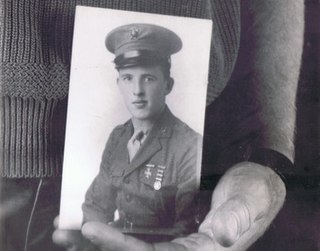
A Matter of Conscience: GI Resistance During the Vietnam War is an artist book published in 1992 at the time of the Addison Gallery of American Art exhibition, “A Matter of Conscience” and “Vietnam Revisited.” It contains oral histories of Vietnam era GIs gathered and edited by Willa Seidenberg and William Short and 58 photographs by William Short. Each oral history is complemented by a portrait in which the Vietnam veteran holds an object of some significance such as a newspaper clipping, a legal document, a book, or photograph. The large black and white photographs allow readers to see the veteran while reading the brief but moving oral histories to learn why they turned against the Vietnam War. The veterans' stories and portraits were collected over a five-year period and have been exhibited throughout the United States, Vietnam, Japan and Australia. A number of them were also included in the book Waging Peace in Vietnam: U.S. Soldiers and Veterans Who Opposed the War edited by Ron Carver, David Cortright, and Barbara Doherty. It was published in September 2019 by New Village Press.

The court-martial of Susan Schnall, a lieutenant U.S. Navy nurse stationed at the Oakland Naval Hospital in Oakland, California, took place in early 1969 during the Vietnam War. Her political activities, which led to the military trial, may have garnered some of the most provocative news coverage during the early days of the U.S. antiwar movement against that war. In October 1968, the San Francisco Chronicle called her the “Peace Leaflet Bomber” for raining tens of thousands of antiwar leaflets from a small airplane over several San Francisco Bay Area military installations and the deck of an aircraft carrier. The day after this “bombing” run, she marched in her officer’s uniform at the front of a large antiwar demonstration, knowing it was against military regulations. While the Navy was court-martialing her for "conduct unbecoming an officer", she was publicly telling the press, "As far as I'm concerned, it's conduct unbecoming to officers to send men to die in Vietnam."
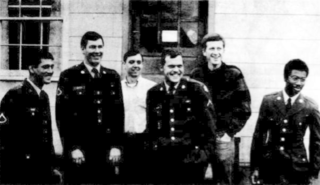
The Fort Lewis Six were six U.S. Army enlisted men at the Fort Lewis Army base in the Seattle and Tacoma, Washington area who in June 1970 refused orders to the Vietnam War and were then courts-martialed. They had all applied for conscientious objector status and been turned down by the Pentagon. The Army then ordered them to report for assignment to Vietnam, which they all refused. The Army responded by charging them with "willful disobedience" which carried a maximum penalty of five years at hard labor. The six soldiers were Private First Class Manuel Perez, a Cuban refugee; Private First Class Paul A. Forest, a British citizen from Liverpool; Specialist 4 Carl M. Dix Jr. from Baltimore; Private James B. Allen from Goldsboro, North Carolina; Private First Class Lawrence Galgano from Brooklyn, New York; and Private First Class Jeffrey C. Griffith from Vaughn, Washington. According to the local GI underground newspaper at Fort Lewis, this was the largest mass refusal of direct orders to Vietnam at the base up to that point in the war. Their refusal and subsequent treatment by the Army received national press coverage.

The GI Underground Press was an underground press movement that emerged among the United States military during the Vietnam War. These were newspapers and newsletters produced without official military approval or acceptance; often furtively distributed under the eyes of "the brass". They were overwhelmingly antiwar and most were anti-military, which tended to infuriate the military command and often resulted in swift retaliation and punishment. Mainly written by rank-and-file active duty or recently discharged GIs, AWOLs and deserters, these publications were intended for their peers and spoke the language and aired the complaints of their audience. They became an integral and powerful element of the larger antiwar, radical and revolutionary movements during those years. This is a history largely ignored and even hidden in the retelling of the U.S. military's role in the Vietnam War.

















